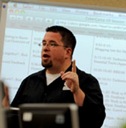 This summer, Bud Hunt will introduce a new course to Powerful Learning Practice’s eCourse lineup. Bud is an instructional technologist for the St. Vrain Valley School District in northern Colorado. Formerly, he taught high school language arts and journalism at Olde Columbine High School in Longmont, Colorado. He is a teacher-consultant with the Colorado State University Writing Project, an affiliate of the National Writing Project, a group working to improve the teaching of writing in schools via regular and meaningful professional development. Bud is a co-founder of Learning 2.0: A Colorado Conversation. He reads, writes, and worries about the future of reading and writing and teaching and learning at http://www.budtheteacher.com.
This summer, Bud Hunt will introduce a new course to Powerful Learning Practice’s eCourse lineup. Bud is an instructional technologist for the St. Vrain Valley School District in northern Colorado. Formerly, he taught high school language arts and journalism at Olde Columbine High School in Longmont, Colorado. He is a teacher-consultant with the Colorado State University Writing Project, an affiliate of the National Writing Project, a group working to improve the teaching of writing in schools via regular and meaningful professional development. Bud is a co-founder of Learning 2.0: A Colorado Conversation. He reads, writes, and worries about the future of reading and writing and teaching and learning at http://www.budtheteacher.com.
In this interview, Bud discusses his new eCourse and what participants can expect to experience in his five-week course.
________
1. What inspired you to create your “Reading the Web” eCourse?
A great deal of my work lately has been centered on assumptions of difference. People seem really excited by the idea that today is different from any other time in human history, and that current technology is unlike anything that has ever come before. But, of course, that’s always been true – every day is different than the day before. That said, it seems to me that when we begin to think about the difference of tomorrow, we can focus on what’s important from yesterday. So that’s where the class came from – my wondering about what’s “changed” about reading, and what’s worth keeping with us as we move from print books to ebooks or Websites or HTML or the app or whatever is the container of tomorrow’s books. We are in the early stages of electronic reading tools and apps and services, and I think it’s a delightful time to be a reader or a writer.
2. Who should take this course?
Anyone who is enthusiastic about the potential of reading and readers and the technology of both. I also think folks whose Spidey senses tingle whenever they hear broad generalizations about e-reading versus analog print texts would benefit from the course. Of course, I’d say, too, that folks who make those broad generalizations should be front and center. I also think that if you’re a teacher who is teaching reading and writing, or you’re a reader who is stuck in a place between ereading and print texts, you’ll find the exploration in this course useful.
3. What will the learning experience be like for participants?
We’ll begin by taking a look at some of the foundations of reading theory – ideas about what happens when students are reading and what we value as readers and teachers of reading. From there, we’ll move into exploration and discovery mode – we’ll consider different types and modalities and tools, all with that theoretical background to guide us and to help us talk to one another about what we see when we look at new spaces for reading and storing and sharing our reading. To conclude the course, we’ll think about applications from our discoveries that we can incorporate into our personal and professional lives, as well as ideas for future classroom considerations.
4. Tell us about some of the learning activities.
Many of our activities will be the same activities that good readers engage in all the time. We’ll search for sources of books. We’ll discover online libraries and talk about the commerce of ereading. We’ll try out reading apps, and annotation apps. We will make marks on the Web. We’ll read – together and apart – and attempt to build a community of readers who are tackling the same texts, or who are working to share with each other. If you’ve always wanted an excuse to download ebooks and read them with others, or to be in conversation about whether a “book” is only a book because it’s on paper, this is the course for you.
5. What will participants walk away with after taking this course?
I hope that participants will have the opportunity to broaden their sense of “reading” and “books,” but also that they will see that reading has always been a technology-rich human endeavor. It’s an exciting time to be a reader. And there’s plenty of new territory to explore, but hopefully, course participants will explore that territory intentionally, thinking carefully about how technology shapes reading. I also hope that participants renew their sense of play – we learn best about new tools and habits by taking them on and trying them out.
Ready to start your adventure into “Reading the Web”? Sign up now for the next section of this eCourse by clicking on the logo below.
Christen Dodd
Latest posts by Christen Dodd (see all)
- Breaking Hyflex & Remote Learning Visual Barriers - October 15, 2020
- Is Your Lifeboat Secure? - September 26, 2020
- Going Into the Unknown - August 17, 2020


